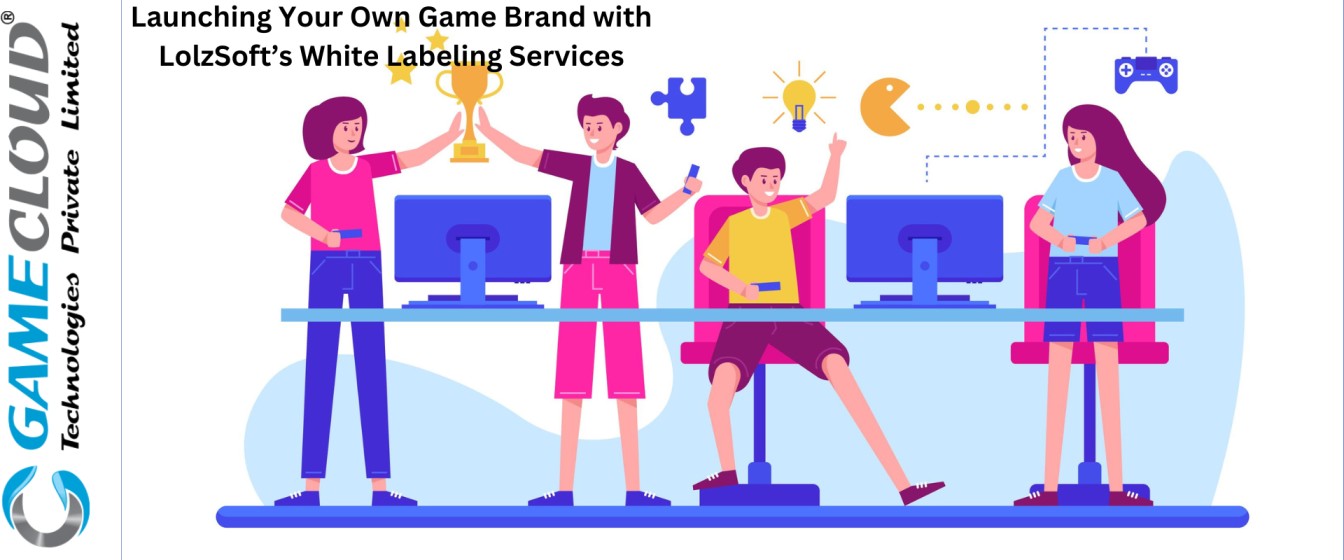
White labeling is a popular business strategy that allows companies to sell products or services developed by another company under their own brand name. This approach is particularly beneficial for businesses looking to launch their own game brand, as it enables them to utilize the expertise of experienced game developers without the need for extensive in-house resources or development costs.
There are several benefits to using white labeling services for game development:
- Cost Savings: White labeling allows businesses to save on the costs associated with game development, such as hiring developers, purchasing software, and managing infrastructure. This can result in significant cost savings, especially for small businesses or startups with limited budgets.
- Faster Time-to-Market: By utilizing the expertise of a white label provider, businesses can launch their game brand more quickly than if they were to develop games in-house. This can help businesses gain a competitive edge and capitalize on market trends more effectively.
- Quality Assurance: White label providers typically have extensive experience in game development and adhere to high-quality standards. This ensures that the games delivered to businesses are of high quality, reliable, and perform well.
- Brand Consistency: White labeling allows businesses to maintain consistent branding across all aspects of their platform or website, including games. This can help strengthen brand identity and improve user experience.
- Scalability: White labeling enables businesses to scale their game offerings more easily, as they can simply add more games to their platform or website as needed. This can help businesses grow their user base and revenue over time.
How to choose the right white labeling service for your game brand
When choosing a white labeling service for your game brand, there are several factors to consider to ensure that you select a reliable and reputable provider that can meet your needs and help you achieve your business goals.
Firstly, it is essential to research the provider’s reputation in the gaming industry. Look for reviews and testimonials from other businesses that have used their white label services. A reliable provider should have a positive track record and a history of delivering high-quality gaming solutions. Additionally, ensure that the white label gaming provider is properly licensed and compliant with all relevant laws and regulations, especially in the heavily regulated gaming industry.

Secondly, assess the range and quality of games offered by the white label provider. A diverse and engaging game library will attract more players and keep them coming back for more. Customisation options are also crucial, as your gaming platform should reflect your unique identity and vision. Check if the white label solution allows for customisation to align with your brand and target audience.
Thirdly, a user-friendly interface and smooth gaming experience are essential for player retention. Test the games and platform yourself to ensure they meet your expectations. Technical support and reliability are also critical factors to consider. A reliable white label provider should offer robust technical support and ensure the platform’s stability and uptime. Prompt resolution of issues is critical to maintaining player satisfaction.
Fourthly, payment processing and security are crucial for any online gaming platform. Verify that the white label provider has secure payment processing options and complies with industry standards for data protection and security. Mobile compatibility is also essential, as more and more players are using mobile devices for gaming.
Fifthly, consider the potential for growth and scalability with the white label provider. You’ll want a partner that can accommodate your expansion plans. Pricing and revenue sharing should also align with your financial goals and business strategy.
Lastly, review the contract and legal agreements thoroughly before finalizing the partnership. Ensure that all terms and conditions are fair and favorable for your business. Take your time to research and compare different white label gaming providers to find the one that best suits your needs and objectives. Don’t hesitate to ask for demos or trial periods to get hands-on experience before making a decision.
Hence, choosing a reliable white label for gaming is a significant investment, so it’s essential to make an informed choice. Consider factors such as reputation and track record, licensing and compliance, game variety and quality, customisation options, user experience and interface, technical support and reliability, payment processing and security, mobile compatibility, scalability, pricing and revenue sharing, and legal considerations. By selecting a reputable and reliable white label provider, you can utilize their expertise and resources to launch and grow your own game brand successfully.
STEP 1: Selection of a White Label Provider
When businesses embark on selecting a white label provider for game development, the process involves a meticulous evaluation to ensure the chosen provider aligns with their specific needs and can deliver high-quality games. The initial step in this selection process is to identify a reputable white label provider with a proven track record in game development. This entails conducting thorough research into the provider’s background, reputation, and portfolio to gauge their expertise and experience in delivering successful gaming solutions.
A critical aspect of choosing the right white label provider is assessing their ability to cater to the unique requirements of the business. The provider should not only offer a range of game development services but also be capable of customizing games to align with the business’s brand identity and target audience. This customisation aspect is crucial as it ensures that the games resonate with the business’s overall vision and aesthetic, enhancing the brand’s appeal and user experience.
Moreover, businesses should prioritize selecting a white label provider that can offer a comprehensive and robust solution for game development. This includes evaluating the provider’s technical capabilities, game library, and support services to ensure they can meet the business’s requirements effectively. The provider should have the necessary infrastructure, resources, and expertise to develop high-quality games that engage users and drive business growth.
STEP 2: Proper and Enhanced Customisation
Customisation plays a pivotal role in the success of a white label game development partnership. Once a provider is selected, businesses have the opportunity to tailor the games to reflect their unique brand identity and resonate with their target audience. This customisation process involves incorporating branding elements such as logos, colors, and design features that align with the business’s overall aesthetic and messaging. By infusing these personalized touches into the games, businesses can create a cohesive and immersive gaming experience that reinforces their brand identity and strengthens their connection with players.
The ability to customize games allows businesses to differentiate themselves in a competitive market and stand out from generic offerings. By infusing their branding elements into the games, businesses can create a distinct and memorable gaming experience that sets them apart from competitors. This customisation not only enhances brand recognition but also fosters brand loyalty among players who resonate with the brand’s values and visual identity.
Moreover, customisation extends beyond just branding elements to encompass gameplay features, mechanics, and user interfaces. Businesses can work closely with the white label provider to tailor the games to meet their specific requirements and preferences. This collaborative approach ensures that the games are not only visually aligned with the brand but also offer a unique and engaging gameplay experience that caters to the target audience’s preferences and expectations.

Ultimately, customisation in white label game development empowers businesses to create a tailored and immersive gaming experience that reflects their brand identity and resonates with their audience. By utilizing customization options to infuse branding elements, design features, and gameplay mechanics that align with their vision, businesses can establish a strong brand presence in the gaming industry and forge meaningful connections with players. Customisation serves as a powerful tool for businesses to differentiate themselves, drive engagement, and build a loyal player base in a competitive gaming landscape.
STEP 3: Integrating the Customized Games
Integration is a critical phase in the process of launching a white label game brand, where the customized games are seamlessly incorporated into the business’s platform or website. This integration step is essential as it enables users to access and play the games directly, creating a cohesive and immersive gaming experience for players. By integrating the games into the business’s platform, businesses can provide a seamless and convenient gaming environment for their audience, enhancing user engagement and retention.
The integration process involves ensuring that the games are smoothly embedded within the existing infrastructure of the business’s platform or website. This requires technical expertise and coordination between the white label provider and the business’s IT team to ensure compatibility, functionality, and performance. By integrating the games effectively, businesses can offer a unified and user-friendly gaming experience that encourages prolonged engagement and loyalty among players.
Furthermore, integration allows businesses to attract the full potential of the customized games by seamlessly incorporating them into their platform’s user interface and navigation. This cohesive integration not only enhances the overall user experience but also reinforces the brand identity and messaging throughout the gaming environment. By integrating the games into the platform, businesses can create a consistent and engaging gaming ecosystem that reflects their brand values and resonates with their audience.
In essence, integration is a crucial step in the process of launching a white label game brand, as it enables businesses to seamlessly incorporate customized games into their platform or website. By ensuring a smooth and efficient integration process, businesses can provide a cohesive and immersive gaming experience for their audience, driving user engagement, retention, and brand loyalty. Effective integration of customized games not only enhances the overall user experience but also strengthens the brand presence in the competitive gaming industry, positioning businesses for success and growth in the digital gaming landscape.
STEP 4: Marketing and Promotion
Once the customized games are integrated into the business’s platform or website, businesses can grasp various marketing and promotion channels to reach their target audience and drive user engagement. By utilizing channels such as social media, email marketing, and influencer partnerships, businesses can effectively promote their white label games and build a loyal player base.
Social media is a powerful tool for marketing and promoting white label games, as it allows businesses to reach a wide and diverse audience. By creating engaging social media content, businesses can showcase their games and generate interest among potential players. This can include sharing game trailers, screenshots, and gameplay footage, as well as hosting social media events and contests to build excitement around the games. By using social media, businesses can create a buzz around their white label games and attract a large and engaged audience.
Email marketing is another effective channel for promoting white label games, as it allows businesses to reach their existing customer base and promote their games directly to their inbox. By creating targeted and personalized email campaigns, businesses can effectively promote their white label games to their subscribers and encourage them to try the games. This can include offering exclusive promotions, discounts, and bonuses to entice players to engage with the games. By utilizing email marketing, businesses can build a loyal player base and drive user engagement with their white label games.
Influencer partnerships are also a valuable tool for promoting white label games, as they allow businesses to tap into the influence and reach of popular gaming influencers. By partnering with influencers who have a large and engaged following, businesses can promote their white label games to a wider audience and build credibility and trust among potential players. This can include hosting influencer events, sponsoring influencer content, and offering exclusive promotions and bonuses to influencer followers.

What are the legal considerations when white labeling game brands?
When white labeling game brands, businesses must consider legal and regulatory requirements to ensure compliance with industry standards and protect their intellectual property. Here are some legal considerations to keep in mind:
- Licensing and Regulatory Compliance: White label providers must comply with licensing and regulatory requirements in the jurisdictions where they operate. Businesses must ensure that the white label provider has the necessary licenses and certifications to operate in the gaming industry.
- Intellectual Property: White label providers must have the necessary rights and permissions to use the intellectual property of the games they offer. Businesses must ensure that the white label provider has obtained the necessary licenses and permissions from the game developers to use their intellectual property.
- Data Protection: White label providers must comply with data protection regulations, such as the General Data Protection Regulation (GDPR) and the California Consumer Privacy Act (CCPA). Businesses must ensure that the white label provider has implemented appropriate data protection measures to protect user data.
- Terms and Conditions: White label providers must have clear and transparent terms and conditions that outline the rights and responsibilities of both parties. Businesses must ensure that the white label provider’s terms and conditions align with their own terms and conditions and comply with industry standards.
- Dispute Resolution: White label providers must have a clear dispute resolution process in place to address any disputes that may arise between the parties. Businesses must ensure that the white label provider’s dispute resolution process is fair, transparent, and efficient.
Reskinning and Customisation in White Labeling Services by LolzSoft
LolzSoft, a sub-brand of GameCloud Technologies Pvt Ltd, is a leading provider of white labeling services for the gaming industry, focusing on reskinning and customization of games. By reskinning, LolzSoft changes the texture and appearance of licensed games while retaining the original gameplay, creating a fresh and engaging experience for players. In addition to reskinning, LolzSoft offers customisation in the original gameplay to make the overall game more appealing to the end-user.
Reskinning is crucial in the gaming industry because selling the same game with only a change of brand name does not work. To stand out from the competition, businesses need to offer unique and engaging gaming experiences. By reskinning and customising games, LolzSoft ensures that businesses can create a cohesive and immersive gaming experience that resonates with their target audience and aligns with their brand identity.
LolzSoft’s approach to reskinning and customisation in white labeling services is not limited to visual elements. The company also offers customisation in gameplay mechanics and features, allowing businesses to design gameplay that aligns with their target audience and business goals. This customisation enables businesses to create innovative and engaging games that attract and retain players. LolzSoft strictly adheres to the ethical practice of reskinning, white labeling, and customizing only those game templates that are officially licensed for such modifications by the original developers, ensuring full compliance with intellectual property laws and developer agreements.
By focusing on reskinning and customisation, LolzSoft is leading the way in white labeling services for the gaming industry. The company’s commitment to delivering high-quality, tailored gaming experiences sets it apart from competitors and positions it as a trusted partner for businesses looking to launch their own game brand.
Conclusion
White labeling services offer a cost-effective and efficient solution for businesses looking to launch their own game brand. By partnering with a reputable white label provider, businesses can utilize the expertise of experienced game developers, save on development costs, and maintain consistent branding across all aspects of their platform or website. With the ability to quickly launch high-quality games and scale offerings as needed, white labeling services provide a valuable opportunity for businesses to grow and succeed in the competitive gaming industry.
